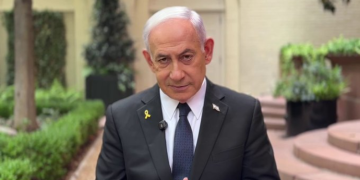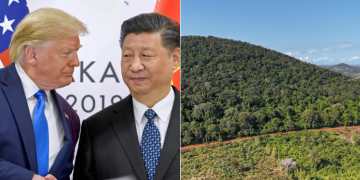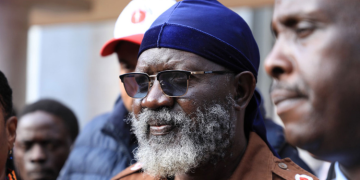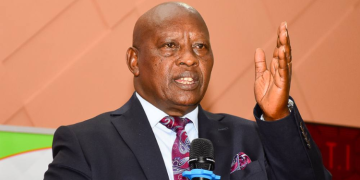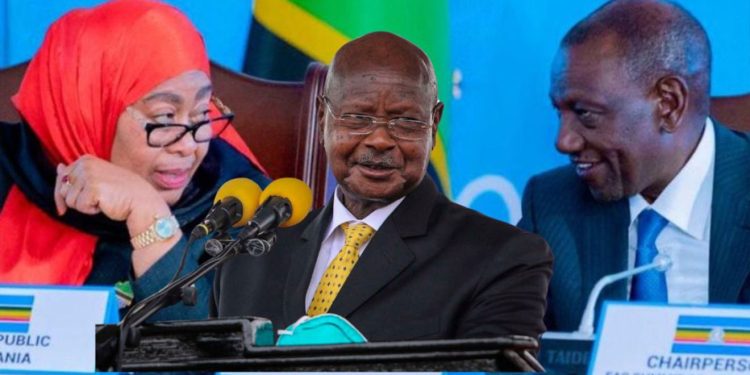The old-guard establishments of East Africa are operating on a fatal miscalculation. They are running a 20th-century political playbook against a 21st-century generation that has already changed the rules of the game. The pillars of fear, division, and information control that have propped up regimes for decades are crumbling, and the upcoming elections in Uganda and Tanzania are set to become the flashpoint for this new reality.
The most important evidence of this shift did not come from a political rally, but from the streets of Nairobi. During Kenya’s “GenZ protests,” a leaderless, digitally-native cohort brought the state to its knees.
The defining image was not just the occupation of parliament; it was the aftermath. When security forces responded with live ammunition, killing dozens, the old playbook dictated that the streets would clear.
Instead, they kept coming. This fearlessness is the new, non-negotiable variable. This is a generation that, having been offered no stake in the current system, feels it has nothing to lose by dismantling it.
Regional awakening
This is not an isolated Kenyan phenomenon. It is a regional awakening. The Kenyan GenZ movement was a declaration of fearlessness; the spontaneous protest at the Tanzania-Kenya border in October 2025 was a declaration of unity, driven by a digitally native, pan-African generation that views borders as mere administrative lines, not genuine barriers to their solidarity.
When Tanzanian authorities detained an opposition figure, they expected a local, manageable political spat. What they got was a flash mob, organized in minutes on TikTok, composed of both Kenyan and Tanzanian youth.
Also Read: Suluhu Under Pressure as Tanzania Elections Are Reduced to One-Horse Race
These young people showed up at a border, united by a shared sense of injustice, and forced a government to “blink first.” This event was chilling for the region’s leaders because it confirmed their worst fears. This generation does not share the ethnic or nationalistic differences of their political leaders.
They are united by a shared experience. They see the state not as a provider, but as the primary obstacle to their survival.
Governments in Kampala and Dodoma cannot keep doing what they have always done because their primary tools are now obsolete.
- Repression is Now a Mobilization Tool: The sight of brutality no longer guarantees submission. As Kenya’s bloody protests showed, it now serves as fuel, validating the protest’s righteousness and sparking international outrage.
- Information Control is Impossible: While leaders plot internet shutdowns, the youth are already communicating via VPNs, offline mesh networks, and cross-border SIM cards. They are digital natives; the state is a digital tourist.
- Ethnic Division is Ineffective: This generation connects on TikTok and X (formerly Twitter) based on shared interests and shared economic pain, not on the tribal rivalries their leaders use to divide and conquer.
Popular mood in Tanzania, Uganda
History is filled with warnings for regimes that misread the popular mood, and that history is repeating itself with breathtaking speed.
In 2009, a youth-led protest in Madagascar toppled the government; just this month, in October 2025, the ‘Gen Z Madagascar’ movement did it again.
In 2024, the ‘Student Quota Reform Movement’ in Bangladesh, driven by students, escalated into a nationwide uprising that toppled the government and forced the prime minister to flee.
Also, in 2006, Nepal’s ‘Loktantra Andolan’ uprising ended the absolute monarchy; in September 2025, a new generation of Nepalese youth rose up in deadly protests that forced their prime minister’s resignation.
These events show that once a critical mass of a population, particularly its youth, decides a regime is illegitimate and loses its fear, the state’s monopoly on force becomes surprisingly brittle.
As Uganda and Tanzania head toward elections, their establishments are preparing for a traditional fight. They are readying their police, managing their state media, and preparing to arrest the usual opposition figures. This is the “one mistake” that could bring the whole establishment crumbling down.
Also Read: University Student Jailed Over TikTok Video on Museveni
The surprise will be total. When the protests erupt, the old guard will be looking for a leader to arrest, a political party to ban, or an ethnic grievance to exploit. They will find none. They will be shocked by the speed of the mobilization and bewildered when their tried-and-tested methods of force and fear only amplify the defiance. They are meticulously preparing for a war that has already been made obsolete.
They are not preparing for the real threat: a leaderless, borderless, fearless cohort that is already coordinating in a digital space they cannot control. They are not facing a fragmented opposition; they are facing a united generation. And this generation is not just ready to act, it is desperate too.
About the author
This article was written by Abdiqani Abdullahi. He is an English News Editor and Senior Advisor on International Relations at Somalia’s National News Agency (SONNA). He has more than a decade of experience at the nexus of policy, governance, and media.
His expertise spans strategic communication, digital transformation, and public diplomacy, including leading cybersecurity and transparency reforms under the DFID-supported Open Government Initiative. Previously, he worked on integrating AI and digital tools into newsroom operations, strengthening media ethics and crisis communication. With a strong background in international relations and journalism, he is passionate about the media’s role in shaping national narratives, promoting accountability, and highlighting innovation across the Horn of Africa.
The views expressed in this opinion piece are the authors’ own and do not represent The Kenya Times’ editorial position.
Follow our WhatsApp Channel and X Account for real-time news updates.




